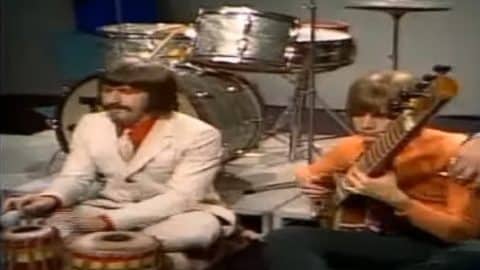5 Moody Blues Songs That The Late Mike Pinder Made Amazing

via kas0741 / Youtube
The music world mourns the passing of Mike Pinder, a founding member of the legendary rock band The Moody Blues. Pinder, who played keyboards and occasionally sang lead vocals, left an ineffaceable mark on the group’s sound from his 1964 debut to his departure in 1978.
Beyond his musical contributions, Pinder is particularly known for his mastery of the Mellotron, a keyboard instrument that mimicked the sounds of an orchestra, adding a unique depth and texture to the band’s music.
While the Moody Blues are primarily known for hits penned by Justin Hayward and John Lodge, Pinder himself wrote and sang on several of their most beloved songs. He also displayed incredible versatility in the studio, playing not only the Mellotron but also piano, organ, cello, harpsichord, and even bass guitar.
In celebration of Pinder’s life and musical legacy, let’s revisit five outstanding Moody Blues songs where his talent truly shines.
“Go Now” (1964)
The Moody Blues swiftly rose to fame with their rendition of “Go Now”, originally a soulful melody penned by Larry Banks and Milton Bennett. This track, initially brought to life by Bessie Banks in early 1964, was later reimagined by The Moody Blues and featured the vocal talents of Denny Laine. Released towards the end of 1964, their version captured the hearts of the U.K. audience, climbing to the pinnacle of the charts by January 1965.
Their single not only conquered the U.K. charts but also made a significant impact across the Atlantic, securing the No. 10 spot on the Billboard Hot 100. This achievement marked a defining moment for the band, establishing them as a force to be reckoned with in the international music scene.
A standout element of “Go Now” is the expressive piano solo by Mike, which adds a layer of depth and emotion to the song. Complementing Pinder’s performance, the keyboardist’s harmonious backing vocals further enriched the track’s soulful essence, contributing to its enduring popularity.
“Late Lament” (1967)
The year 1967 marked a pivotal transformation for The Moody Blues as they embraced the vibrant hues of psychedelic pop-rock. Their groundbreaking second album, Days of Future Passed, emerged as a historical milestone, showcasing an unprecedented collaboration with the London Festival Orchestra. This fusion of rock and classical elements heralded a new era for the band, setting them apart in the music landscape.
Pinder’s contributions to “Days of Future Passed” were multifaceted, as he not only penned and performed songs but also left an indelible mark with “Late Lament”. This cosmic spoken-word interlude, delivered by Pinder at the album’s conclusion, followed the hauntingly beautiful “Nights in White Satin”. The recitation of Graeme Edge’s poetic verses added a profound depth to the record, resonating with fans and critics alike.
The tradition initiated by “Late Lament” continued to weave through the fabric of The Moody Blues’ subsequent albums. A series of five albums were graced with spoken-word pieces, all stemming from the creative wellspring of drummer Graeme Edge and brought to life through the distinctive voice of Mike Pinder. This unique element became a signature of the band’s evolving sound, enriching their musical narrative with introspective and philosophical layers.
“The Dream” / “Have You Heard (Part 1)” / “The Voyage” / “Have You Heard (Part 2)” (1969)
The Moody Blues’ On the Threshold of a Dream album culminates with a powerful suite of songs that weave a narrative of introspection and enlightenment. Pinder’s compositional prowess is on full display as he brings the album to a close with “The Dream”, a spoken-word piece penned by Edge. This prelude seamlessly transitions into the two-part musical exploration “Have You Heard”, interspersed with the evocative instrumental, “The Voyage”.
Listeners are invited to embark on an auditory expedition that transcends the ordinary. The suite’s lyrics delve into themes of spiritual interconnectedness, urging a collective contemplation of our place in the universe. The journey is both inward and expansive, challenging the listener to consider the profound concept of universal oneness.
“The Voyage” stands out as a centerpiece in this musical odyssey, incorporating a tribute to Richard Strauss’ iconic composition “Thus Spake Zarathustra”. This nod to classical music, interwoven with the band’s signature psychedelic rock sound, creates a bridge between genres and eras. It’s a fitting homage that resonates with the spirit of exploration, famously echoed in the 1969 cinematic masterpiece 2001: A Space Odyssey.
“Out and In” (1969)
The song “Out and In” graced The Moody Blues’ fifth album, To Our Children’s Children’s Children, offering listeners a harmonious blend of melody and introspection. Sung with passion by Pinder and co-crafted alongside John Lodge, the track stands out as a hallmark of the band’s progressive rock style.
With its uplifting tune, “Out and In” serves as a call to embark on a spiritual odyssey. The lyrics inspire a dual exploration—casting one’s gaze to the vast cosmos while simultaneously delving into the depths of the inner self. It’s a song that encourages listeners to contemplate their place in the universe and their own essence.
The Moody Blues, through this song, invite their audience to join them on a quest for understanding and self-discovery. The music acts as a guide, leading through the external expanse of space and the internal landscape of the soul, suggesting that the journey outward and the journey inward are intrinsically connected.
“Melancholy Man” (1970)
The 1970 release of The Moody Blues’ album A Question of Balance brought with it the profound track “Melancholy Man”, a showcase for Pinder’s evocative storytelling through music. The song, steeped in a somber tone, is delivered from the viewpoint of a man who, despite recognizing the world’s hardships, holds onto the hopeful belief that humanity has the power to foster positive change.
“Melancholy Man” is a testament to the enduring spirit of optimism. It’s a musical expression of the duality of human experience—the acknowledgment of life’s challenges paired with the conviction that collective efforts can lead to a brighter future. This message resonates through the song’s melancholic melody, offering a comforting reminder of the potential for human betterment.
While “Melancholy Man” may have been the understated B-side to the hit “The Story in Your Eyes” in the United States, its impact was felt more profoundly in France. There, it claimed the top spot on the singles chart, reigning for four consecutive weeks in November 1970.

















